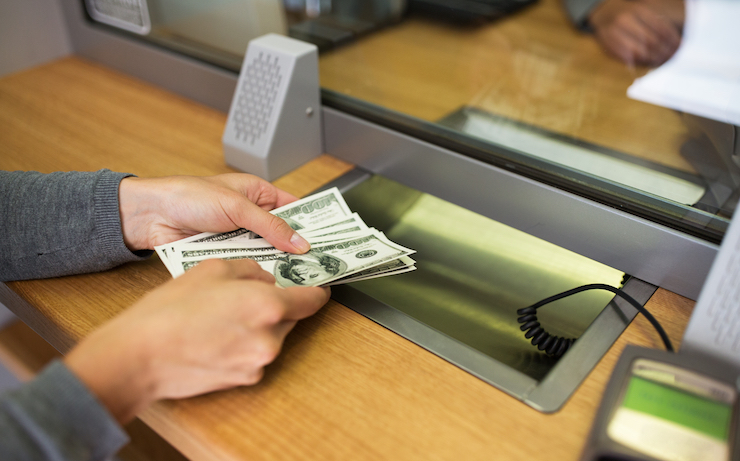Can a bank ask why you are withdrawing money? Verifique isto – Can a bank stop me from withdrawing money

Banks may freeze bank accounts if they suspect illegal activity such as money laundering, terrorist financing, or writing bad checks. Creditors can seek judgment against you which can lead a bank to freeze your account. The government can request an account freeze for any unpaid taxes or student loans.The good news is, if someone only has your bank account number, that won't give them enough intel to do any damage. Take comfort in knowing that no one will be able to withdraw money in your account if all they have is your account number.
Take your debit card, or a form of ID and your account details, and they can process the withdrawal for you, as long as you have enough funds.
What Is a Withdrawal A withdrawal involves removing funds from a bank account, savings plan, pension, or trust.
How much money can I withdraw without being flagged
Banks are required to report any single transactions involving the withdrawal of $10,000 or more in cash or cash equivalents, such as cashier's checks or money orders. This rule applies to lump-sum withdrawals or deposits and related payments that occur within 24 hours.A frequently cited limit on the most cash you can withdraw at any one time is $10,000. However, the reality is that withdrawals of $10,000 or greater are allowed, but they will trigger federal government reporting requirements.How Do Banks Investigate Fraud Bank investigators will usually start with the transaction data and look for likely indicators of fraud. Time stamps, location data, IP addresses, and other elements can be used to prove whether or not the cardholder was involved in the transaction.
Most often, ATM cash withdrawal limits range from $300 to $1,000 per day. Again, this is determined by the bank or credit union—there is no standard daily ATM withdrawal limit. Your personal bank ATM withdrawal limit also may depend on the types of accounts you have and your banking history.
How much money can you withdraw from a bank without it being reported
Banks are required to report any single transactions involving the withdrawal of $10,000 or more in cash or cash equivalents, such as cashier's checks or money orders.A frequently cited limit on the most cash you can withdraw at any one time is $10,000. However, the reality is that withdrawals of $10,000 or greater are allowed, but they will trigger federal government reporting requirements.Many Indian banks allow their account holders the right to withdraw up to ₹1 Lakh through cheque per day. However, this only applies for cheques that indicate self-use or self-addressal.
The ATM has a 50,000 limit per day.
Also, under federal law, banks are required to report any transactions of cash which total more than $10,000 in any single day: This information is included on a currency transaction report (CTR) and is used to help the government track large transactions and prevent money laundering.
If it is a large amount, the bank teller may question what the money is for. The Bank Secrecy Act requires banks to report any withdrawals of over $10,000. So when they report it or ask about it, they're just doing their job. It helps with bank safety and protects people.
How much cash can you withdraw without being suspicious
Banks are required to report any single transactions involving the withdrawal of $10,000 or more in cash or cash equivalents, such as cashier's checks or money orders.Withdrawals of $10,000
More broadly, the BSA requires banks to report any suspicious activity, so making a withdrawal of $9,999 might raise some red flags as being clearly designed to duck under the $10,000 threshold. So might a series of cash withdrawals over consecutive days that exceed $10,000 in total.According to the FDIC, SAR Reports are used to report all types of suspicious activities affecting depository institutions, including but not limited to money laundering, check fraud and kiting, computer intrusion, wire transfer fraud, mortgage and consumer loan fraud, embezzlement, misuse of position or self-dealing, …

 Facebook
Facebook YouTube
YouTube Twitter
Twitter